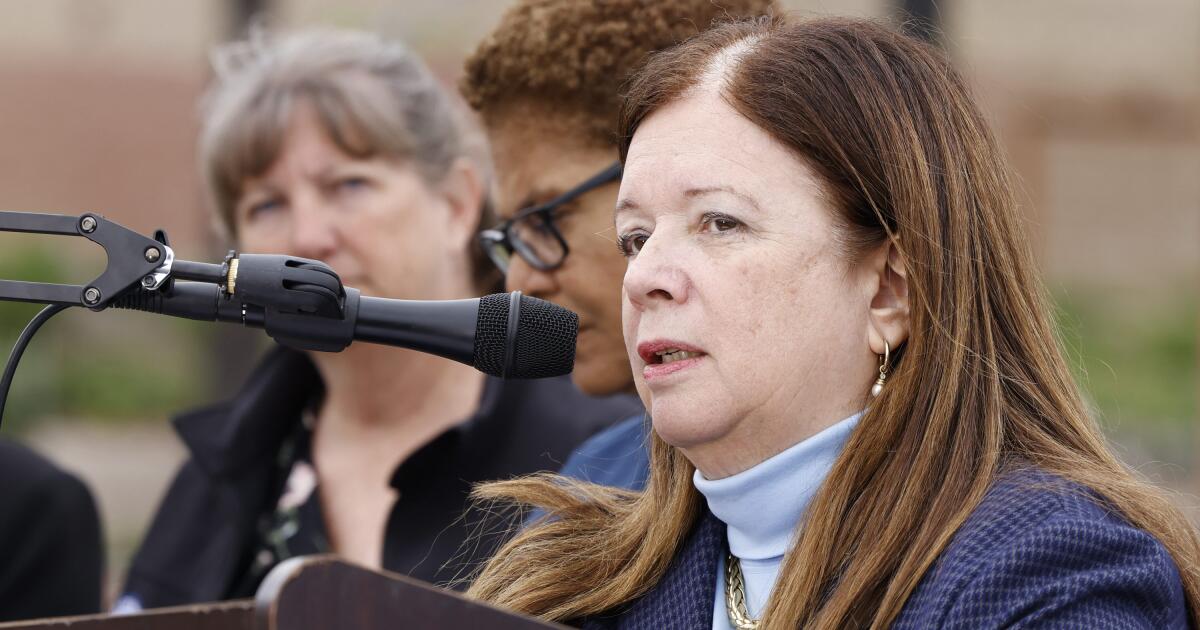L.A. violated open meeting law with plan to clear homeless encampments, judge rules
The city of Los Angeles violated the state’s open meeting law when council members took up a plan to clear 9,800 homeless encampments behind closed doors, a judge ruled this week.
In a 10-page decision, L.A. County Superior Court Judge Curtis Kin said the City Council ran afoul of the Ralph M. Brown Act by approving the encampment strategy during a Jan. 31, 2024, closed session.
The encampment plan was part of a larger effort by the city to comply with a legal settlement with the L.A. Alliance for Human Rights, which had sued over the city’s handling of the homelessness crisis.
Kin, in his ruling, said the city is allowed under the Brown Act to confer with its attorneys in closed-door meetings to discuss legal strategy.
“However, what the City cannot do under the Brown Act is formulate and approve policy decisions in a closed session outside the public eye merely because such decisions are in furtherance of a settlement agreement,” Kin wrote.
Karen Richardson, a spokesperson for City Atty. Hydee Feldstein Soto, said her office had no comment on the decision, which was issued earlier this week.
The ruling delivered a victory to the Los Angeles Community Action Network, which advocates for homeless residents and had sued the city over the closed-door deliberations.
Lawyers for LA CAN have warned that the city’s goal of removing 9,800 encampments over four years has created a quota system that could make sanitation workers more likely to violate the property rights of unhoused residents. Under the agreement, the city must reach its encampment removal target this summer.
“The City Council approved an extremely controversial plan to clear almost 10,000 encampments entirely in secret,” said Shayla Myers, the group’s attorney. “They never disclosed the plan before they voted on it, or even after, and the only one they disclosed the plan to was the business community.”
Lawyers for the city have offered contradictory explanations for what transpired during the Jan. 31, 2024, meeting. Now, LA CAN is seeking a court order requiring that the city produce all records — including audio of the closed-door deliberations — to show what transpired.
The city’s strategy for clearing 9,800 encampments has become a major sticking point in its long-running legal battle with the LA Alliance. U.S. District Court Judge David O. Carter ruled that a tent discarded by sanitation workers can only count toward the city’s numerical goal if its owner has been offered housing or shelter first.
Feldstein Soto’s legal team, in a memo to the council, said later that the judge had “reinterpreted” some of the city’s settlement obligations.
In this week’s ruling, Kin found that the city violated the Brown Act a second time in May 2024, when the council went behind closed doors to take up another agreement — this one between the city and L.A. County on the delivery of homeless services.
The LA Alliance first sued the city and county in 2020, alleging that too little was being done to address the homelessness crisis, particularly in Skid Row. The city settled the case two years later, agreeing to create 12,915 new shelter beds or other housing opportunities by June 2027.
After that deal was struck, the city began negotiating an accompanying agreement with the LA Alliance to reduce the number of street encampments. Those talks dragged on for more than a year.
The LA Alliance ran out of patience, telling Judge Carter in February 2024 that the city was 447 days late in finalizing its plan and should be sanctioned. The group submitted to the court a copy of the encampment removal plan, saying it had been approved by the City Council on Jan. 31, 2024.
Video from that day’s meeting shows that council members went behind closed doors to discuss the LA Alliance case. When they returned, Deputy City Atty. Jonathan Groat said there was nothing to report from the closed session.
LA CAN demanded that the city produce any vote tally on the encampment plan. The city declined to do so, saying there was no vote.
“To this day, [we] still don’t know who voted for it, or even if a vote was taken at all,” Myers said.
Lawyers for the city have argued that they were not required to issue any report from that closed session meeting. They also have said that the Brown Act allowed the two agreements — the one on encampment removals and the other with the county — to be discussed behind closed doors.
Carter ruled last year that the city had failed to comply with the terms of its settlement agreement with the L.A. Alliance. On Tuesday, he ordered the city to pay $1.6 million to cover the group’s legal fees.
The judge also instructed the city to pay about $201,000 for fees incurred by LA CAN and the LA Catholic Worker, which have intervened in the LA Alliance case.
On Thursday, lawyers for the city notified the court that they intend to appeal the order to pay the various groups.
